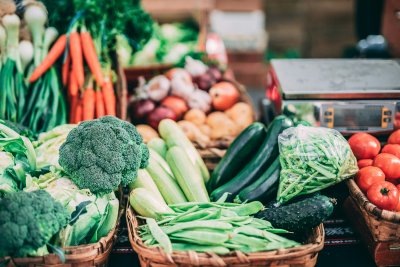Blogs • Children's Food Campaign
Five things you need to know about the proposed Junk Food Tax
Children's Food Campaign Co-ordinator Barbara Crowther looks at the questions raised by proposals in the National Food Strategy.

The new National Food Strategy has recommended a new Sugar and Salt Reformulation Tax in order to "escape the Junk Food Cycle". They estimate a £3 per kg tax on sugar and £6 per kg tax on salt purchased wholesale by manufacturers for use in processed foods and drink could lead to a daily average reduction of up to 38kcal per person, enough to halt weight gain at a population level and raise an estimated £2.9 - £3.4 billion per year.
1. Why is a Sugar and Salt Reformulation Tax even needed?
Quite simply, as a nation we are eating way more sugar and salt than we should be. We're snacking more as a nation, but there are also vast amounts of added sugar and salt hidden in all sorts of foods we think are quite healthy – from yoghurts to pasta sauces. Obesity can put people at risk of further health problems, including diabetes, heart and circulatory diseases, various cancers, as well as the damaging effects of weight stigma. The NHS already spends more than £6 billion every year treating diet-related disease and this is anticipated to rise to £10 billion a year by 2050. The proposed tax could remove 4-10g sugar from our daily diets, which may not sound much but is equivalent to 3 kilogram bags of sugar per person per year.
2. Why can’t companies just do this themselves, without taxing them?
That’s exactly the approach the Government has been taking so far with the Voluntary Sugar Reduction and Salt Reduction Programme. There has been a bit of progress by some companies on milkshakes and breakfast cereals, but very little progress on products like sweets, chocolate, cakes and biscuits, and in some cases the amount of sugar consumed from these has even increased. So it’s not working well enough as a solution. The companies leading the way say regulation is needed to create a level playing field for the whole industry.
By contrast, since the Government introduced the Soft Drinks Industry Levy back in 2018, companies very quickly managed to take a whopping 44 million kilograms a year out of their drinks (compared to 2015), and the amount of sugar we’re consuming each week in drinks has also decreased, as low and zero-sugar drinks are increasingly promoted and sold instead. The tax approach really works to get business to take action!
3. So what could happen to prices of our favourite food and drink?
Firstly, it’s companies who will have to pay the tax in the first instance, not people like you and me. How much companies pay will depend on how much they remove sugar and salt from their products. The more action they take, the less they would have to pay. So it will be a real incentive to make their products healthier for us. Secondly, the cost of ingredients is often only a small proportion of the overall cost of products – a lot of the price we pay is also manufacturing, distribution, retailing and the brand value of the product, as well as the profit margins of retailers – so taxing ingredients doesn’t always have a huge effect on the end price.
Then there is the question of whether companies pass the increased cost on, or adopt different strategies. When the sugary drinks tax came in, some companies did pass on some of the cost in a small increase in price, but others chose to pay the tax out of their own profit margins. Other companies did not change the price, but slightly reduced their portion sizes. The National Food Strategy has modelled some of these possible changes. It’s likely that prices of some extremely sugary products – like sweets, chocolate, cakes and biscuits – could rise by 15-25%, but these are all products we should be purchasing in smaller quantities to protect our health. Prices of fresh healthier foods – vegetables, fruits, grains, dairy and meat – would not be affected by the tax.
4. What does it mean for people on limited budgets?
There is understandable interest in how any new tax could impact hard working families, and it is important to understand all the effects it may have. Arguing that a sugar and salt tax might hurt poor people is also a classic industry diversion tactic that has been used to try to block public health reform many times before, including in arguments against the Soft Drinks Industry Levy. In fact, in the case of soft drinks, prices and sales have not changed significantly but instead a transition to low and no-sugar drinks has taken place, and sugar consumption has reduced particularly amongst the most disadvantaged households.
And it is the most deprived households who are most at risk of diet-related illnesses that reduce life expectancy, and who can often only afford or access cheap, calorie-dense, processed foods. Children in the most deprived tenth of households are twice at risk of being overweight or obese by the age of 11. So a tax that incentivizes business to reduce the amounts of salt and sugar in these foods is likely to have the greatest impact for those most at risk of diet-related disease.
If taxes are then used to expand other forms of subsidies or support for healthier eating then there could be greater positive impact. The Food Strategy proposes that the money raised by the tax (potentially around £3 billion a year) be used to increase access to healthier fruit and veg, expand school holiday activity and food provision and the Healthy Start scheme, which specifically target the lowest income groups.
5. What happens next?
The National Food Strategy is an independent report to Government, who will issue a response in the form of a White Paper within six months. The Prime Minister, when first presented with it, said he is “not attracted to the idea of extra taxes” but will study the report “with interest”. There undoubtedly needs to be more work on how a Sugar and Salt Reformulation Tax might work in practice, including further modelling on how companies (manufacturers, retailers) and the public might act in response to it, and its potential effect. Any new tax proposal will need to go through legislation, and if agreed, the government would then want to allow companies some time to take sugar and salt out of products before it comes into force. Even the impending threat of the new Sugar and Salt Reformulation Tax may have an effect: in the case of the Soft Drinks Industry Levy, a huge proportion of sugar reduction in drinks took place before it even started, so companies could reduce what they had to pay. The National Food Strategy now puts companies on notice once again that they will need to act fast to reduce salt and sugar.
Sustain and the Children’s Food Campaign will continue to work with partners to advocate for further expansion of levies or taxes on unhealthy snacks, to ringfence the funds raised to benefit children’s health and improve our food, and for more use of the tax system to get industry to break the junk food cycle. Watch this space!
Published Monday 19 July 2021
Children's Food Campaign: Better food and food teaching for children in schools, and protection of children from junk food marketing are the aims of Sustain's high-profile Children's Food Campaign. We also want clear food labelling that can be understood by everyone, including children.





